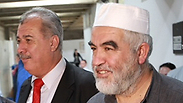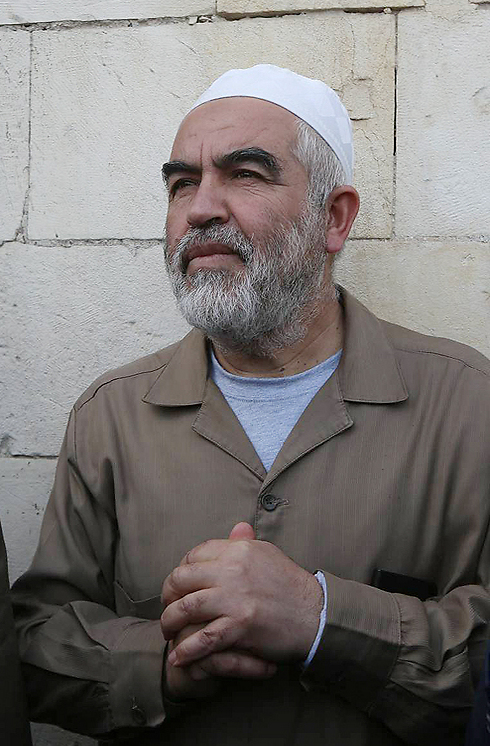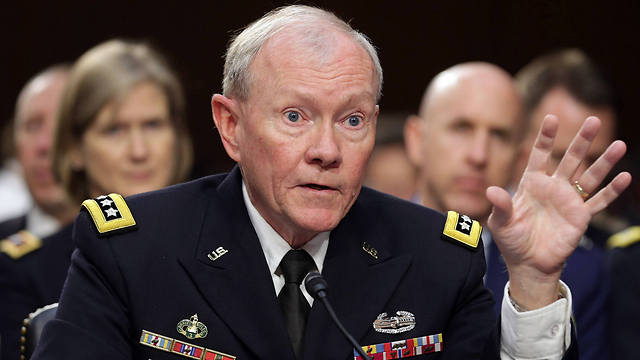
Israel's Arab leaders are only selling isolationism
Op-ed: Silent majority of the Arab community prefers Israel to any other country, and we would do well to give them a voice instead of their agitator MKs.
Most Israeli Arabs are loyal citizens – and when I say most, I mean the vast majority. Within a population of around 1.25 million people (excluding East Jerusalem) there are not only hundreds of hooligans, but thousands, who are likely to have the support of an additional percentage or two.
Troubled times see the extremists flourish. On the backdrop of Islamic Movement leader Raed Salah's ongoing incitement, it would only take one incident to set the sector ablaze. The majority don't attend the demonstrations. But hundreds of youths do. Maybe even thousands. The impression created stains the entire Arab minority.

It's a false impression – because recent years have witnessed not only a process of radicalization among a few thousand, but also one of moderation among tens and hundreds of thousands. Most Israeli Arabs prefer Israel to any other country. Not that it's a paradise. And not that there's no discrimination. There most certainly is. But London for Muslims is no bed of roses. And neither is Paris. And when it comes to the immediate surroundings, one need not elaborate. It's better to live in Kafr Kana than Ramallah.
The desire to integrate is there for all to see. More and more young Arabs are choosing to sign up for National Service; and there are many more who want to but are being deferred due to a shortage of places to fill. Polls, too, indicate that most young Arabs are in favor of National Service.
The Arab leadership, however, is working to the contrary. It wants to increase the alienation. Not only have the National Service recruits been branded "lepers," but the Arab leadership has also established a so-called Anti-National Service Committee. Heading the new panel, set up by the Higher Arab Monitoring Committee, is Hadash Secretary-General Aiman Ouda.
So instead of being dragged along by the violent, racist and rowdy minority, one should bear in mind the silent and peaceful majority. There's a political dispute in play. This majority is far from being Zionist. But it is still a loyal majority, which finds little voice. Rather than repeatedly interviewing the leaders who incite, it would be a good idea to sound out the representatives of the sane majority.
And one of the sane majority's representatives, Israel Police Superintendent Kalef Ka'abiye spoke out this week on a radio talk show. Ka'abiye is a patrol officer in the Zevulun Police – a proud Arab and a proud Israeli. The same talk show also featured Nazareth Mayor Ali Salam. One need not agree with every word he said to be able to say that he made some sense. If they and their ilk, and not the likes of Raed Salah and Haneen Zoabi, were heard three times a day, one could assume, the mood among the Arab sector would be different; and the benefit would be twofold – for the Arabs, and for the Jews.
This is not a predicament unique to Israel. National minorities, in all countries, are no small problem. Israel is not an emigration state. It is the nation state of the Jewish people. Arabs will always sense this inconsistency, even if they can, and do, serve on the Supreme Court or in the role of hospital directors or college presidents; because the solution of both Jewish and democratic is far from perfect. The problem is that all other alternatives, from the "One State" or "State of All its Citizens" department, are far worse.
It didn't work in Czechoslovakia, and it didn't work in Yugoslavia, and it isn't working in Iraq; and Sweden, too, has problems with minorities. Because even in the most tranquil of places in Europe, where there's no occupation, no Temple Mount, and no provocation, national minorities sometimes also comprise a radical minority that creates a violent and frightening presence. There are no easy solutions to these circumstances of friction.
There are no magic cures. But one thing's for sure: One of the conditions for maintaining calm stems from distinguishing between just demands for equality and violent riots. More responsiveness is called for when it comes to the demand for equality. Far less appeasement is required when it comes to manifestations of incitement and violence.
And one more thing: Everything said here about the Arabs also holds true for the Jews. I have argued time and again in recent weeks that the Israeli public for the most part is not stricken with violence, and certainly not racism – despite the incidents of racism and violence in recent months. But left-wing activists, who were backed recently by the president and the education minister, claim something different. They like to label the Jewish sector racist and violent. And this is interesting. Because it is exactly, but exactly, what the rightists do vis-à-vis the Arab sector. Such is the case under normal circumstances.
And such is certainly the case these days. Anyone who believes there is a difference between the margins on the right and the margins on the left is making a mistake. One only needs to listen to them. One only needs sometimes to replace the generalizations about Israelis with generalizations about Arabs, and the claims made against Jews with those made against Muslims. There are no differences. Insofar as margins go, we’re dealing with twins.
* * *
US General Martin Dempsey, chairman of the Joint Chiefs of Staff, surprised everyone a few days ago when he said that "Israel went to extraordinary lengths to limit collateral damage and civilian casualties" during the recent war in Gaza. This declaration contradicts previous statements by the US administration, which accused Israel of not doing enough to avoid civilian casualties.
When US State Department Spokesperson Jen Psaki was questioned on the contradiction between the two positions, she stuck to the old viewpoint and argued: "We believed that Israel could have done more to prevent civilian casualties, and it was important that they held their selves to a high standard." But the AP news agency correspondent pressed Psaki on the issue, charging that the commander of the US military is expected to have a better understanding of matter – to no avail, however. Psaki reiterated the position.
Dempsey's remarks carry special weight in light of a report released by the Bureau of Investigative Journalism, which examined the results of American airstrikes carried out in Pakistan in the framework of targeted-killing operations using drones. Well, between 2004 and 2014, these airstrikes resulted in the death of 2,379 people, of which just 295 were identified as "militants" – in other words, only 12 percent. Or, to clarify the severity of the findings, it turns out that 88 percent of the fatalities were, in all likelihood, innocent civilians. The findings in other reports on the subject of civilian casualties are no less severe.
Dempsey appears to know what he's talking about. That's why a US military delegation was sent to Israel to learn how to protect innocent civilians. These are the facts. But they won't confuse the US administration's highly important spokesperson.
* * *
Iranian Foreign Minister Mohammad Zarif published two posts on Facebook against David Keyes, an Israeli American human rights activist who posed awkward questions to Zarif about the imprisonment of Majid Tavakoli, an Iranian human rights activist. Zarif denied knowing of Tavakoli. Shortly thereafter, and with a little more pressure, Tavakoli was released.
Human rights has become a term that is synonymous with detached entities and activists who have either lost all touch, on one level or another, with the struggle against dark regimes, or work in the service of organizations like Hamas. The darkest body of all is the UN Human Rights Council. Instead of fighting the council, most rights organizations cooperate with it. The Goldstone Report, for instance, is an example of the connection between a dark council and rights organizations.
But there is another way – and an organization like Advancing Human Rights, led by Keyes, is a fine example. Google Inc. itself has stepped in to help was enlisted to help, on a new platform called Movements.org, which allows thousands of genuine rights activists to connect directly with the free world and decision-makers.
Key figures in the dark countries, like Zarif, are swayed by these networks because they are active in them. The New York Times dubbed Keyes "a pioneer in online activism." Many of the rights organizations have given human rights a bad name. There hasn't been a change – only the first small sign of one. We should welcome it.











